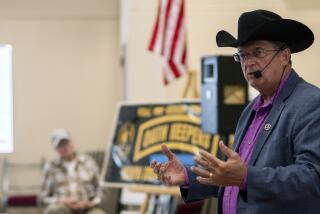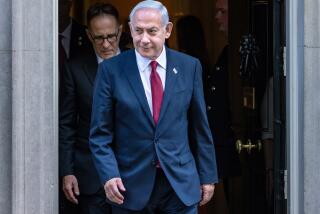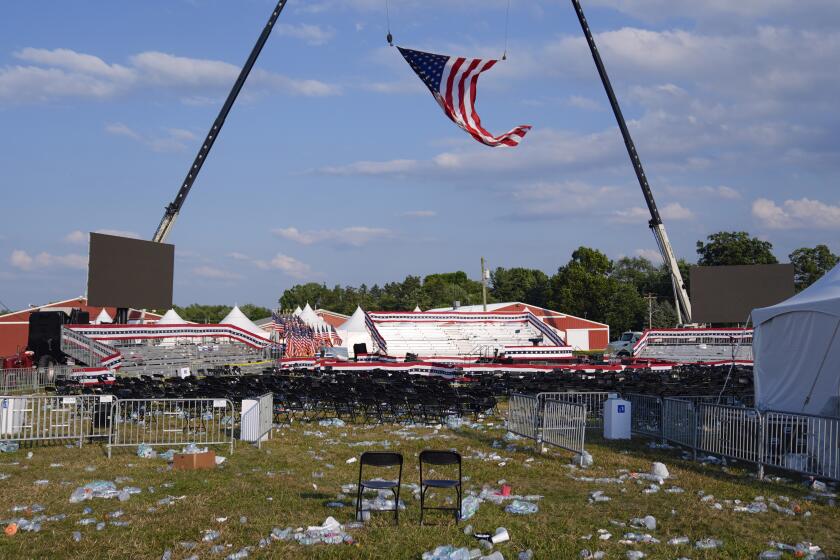Venezuela’s Chavez reelected
Venezuelan President Hugo Chavez was resoundingly reelected Sunday, setting the scene for a promised “deepening” of his socialist revolution and a broader role as leftist lightning rod on the world stage.
With about 80% of the ballots counted, Chavez had captured 61% of the vote, compared with 38% for Manuel Rosales, election officials said.
His reelection is expected to further Latin America’s move to the left after victories by five left-leaning presidential candidates in the region in little more than a year.
Chavez, who pledges to revise his nation’s constitution to allow him to serve indefinitely, may try to fill the leadership void created in July by the illness of Cuba’s Fidel Castro, supporters say.
Relations between the firebrand Chavez and the United States are at an ebb because of suspicion by the Bush administration over Chavez’s overtures to Iran, his billion-dollar arms purchase agreements with Russia, and what Washington says is his lack of cooperation in fighting terrorism and drug trafficking.
Venezuela is the fourth-largest supplier of oil to the United States, and revenue generated by high crude oil prices has allowed Chavez to wield considerable influence among his neighbors through energy subsidies and aid programs.
Chavez, addressing a crowd in front of the presidential palace, bellowed, “Long live the preordained popular victory. Long live the reign of socialism, the future of Venezuela.... Another defeat for the North American empire. Another defeat for the devil. Down with imperialism.”
Rosales conceded Sunday night, saying he was up against “an entire state, all the power of a government in all its structure and dimensions.”
“Tonight we have to recognize that they beat us,” said Rosales, addressing supporters at his campaign headquarters.
The governor of oil-rich Zulia state, Rosales mounted a challenge to Chavez in September after opposition parties belatedly rallied around him.
Despite his decisive loss, observers credited Rosales with laying the groundwork for a new opposition movement.
His campaign complained of several irregularities, including refusals by National Election Commission officials at some polls to open ballot boxes for audits, as is legally required, and the keeping of voting booths open past the deadline.
Chavez and other government officials said the election was a success with no “relevant” irregularities.
“This is my fourth election where my government has been tested, and you can see the dynamism and depth of Venezuelan democracy,” Chavez said after arriving before noon at a polling place in the poor January 23rd neighborhood in Caracas, driving an old Volkswagen Beetle. “It’s a happy day for Venezuela.”
Chavez, who was imprisoned after a failed coup attempt in 1992, was first elected in 1998 and reelected in 2000. He withstood a recall vote in 2004.
Observers say he will waste little time in reshaping the Venezuelan Constitution to advance his “socialism for the 21st century,” which includes opposition to U.S. economic policies, among them a regional free-trade agreement.
Constitutional revisions probably will include unlimited reelections, Chavez told reporters. Without the change, his upcoming term would be his last.
Carlos Escarra, a Chavez confidant and congressman, said in an interview Sunday that he and other legislators would meet this week with Chavez to plan for a sweeping new constitutional “architecture” that would strengthen the legal standing of presidential decrees, such as the transfer of ownership stakes in businesses and factories to worker cooperatives.
Legislative approval of such a revision is considered a foregone conclusion because Chavez loyalists occupy all of the 165 seats in Congress.
Opposition candidates boycotted congressional elections in December 2005.
Opponents fear that the constitutional revisions might produce a more authoritarian state. Although acknowledging his popularity among Venezuela’s poor, Chavez’s critics say he has weakened democratic institutions by taking control of the judiciary, Congress and the military, leaving little room for dissent.
“What is coming is not the deepening of the revolution, because there is none, but of the authoritarianism of Chavez,” said historian Agustin Blanco Munoz of the University of Central Venezuela.
Human rights lawyer Asdrubal Aguilar fears that Chavez will use a constitutional assembly to “liquidate political plurality.... He wants to eliminate diversity and replace it with a personal relation with society.”
Voters waited hours to cast ballots. Lines stretched for blocks, and there were reports of polling machine failures. Opposition voters such as university student Sheila Bermudez, interviewed near the American School, claimed the breakdowns were “tortoise maneuvers” to discourage supporters of Chavez’s opponent.
But long waits to vote were the norm even in pro-Chavez, lower-class neighborhoods such as Las Minas. Store manager Noreliza Iza said her three-hour wait was typical for Venezuelan elections and was “acceptable.”
The Chavez victory had been predicted by virtually all pollsters, who cited his lavish spending on social programs and public works. Escarra said the victory would extend “the leadership of Chavez and Venezuela in the world.”
Since last year, left-leaning candidates have won presidential elections in Chile, Brazil, Ecuador, Nicaragua and Bolivia, although not all adhere to Chavez’s agenda.
Escarra predicted that Chavez would “fill the leadership space” created by Castro’s illness.
Chavez has rhetorically pummeled the United States in recent years while seeking to counter U.S. influence with oil-financed aid programs to Argentina, Bolivia and the Caribbean. Of most concern to the United States are his commercial relations with Iran and his arms deals with Russia.
Chavez this year signed agreements to buy scores of Russian military airplanes and helicopters. He also sealed a deal with Moscow to build an assault rifle factory here.
“Soon we will be selling them to countries in Latin America,” Chavez told reporters last week.
Chavez also criticized Bush in the Thursday interview, saying the U.S. president would “not accept the new world is multipolar, that it won’t kneel before the United States.”
Chavez plans to launch additional massive public works projects, including lumber, steel and aluminum factory cities in eastern Venezuela, and to build another bridge over the Orinoco River, in addition to the $1.2-billion span opened last month.
The links to Brazil, as well as a proposed natural gas pipeline to Argentina, are part of Chavez’s southward development push.
He said his plans also included extending trade relations with China, which announced $5 billion in planned investments here. China and Venezuela also established a $6-billion fund to finance social projects in Venezuela.
Chavez also said he planned to increase the construction of subsidized housing, which totaled 120,000 units this year.
When he took office in 1999, Venezuela was “lost, a ship sinking at sea,” Chavez told reporters. “Now Venezuela has direction.... Yes, we have committed mistakes, and there are many things left to do. That’s why we are getting six more years.”
More to Read
Sign up for Essential California
The most important California stories and recommendations in your inbox every morning.
You may occasionally receive promotional content from the Los Angeles Times.










